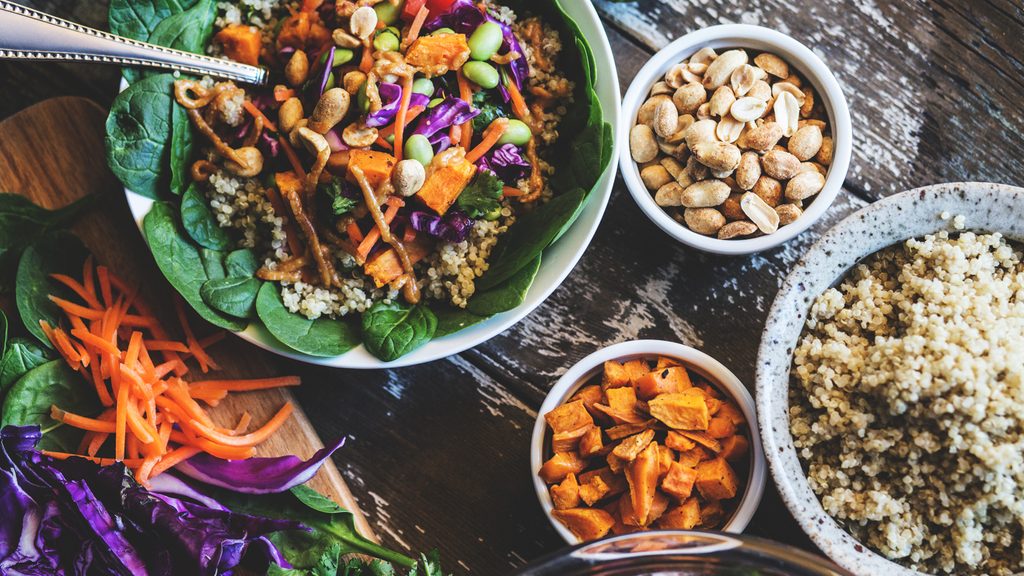Eat These Foods to Improve Your Overall Health

To achieve your best health from the inside out, focus on eating foods that support your immune system, improve gut health, reduce inflammation, lower stress and, ultimately, combat disease.
If you’re looking to get healthier (and, we mean, who isn’t?), you’ll want to get the majority of your daily food intake from high-quality plant-based foods, such as whole fruits and vegetables, whole grains, legumes, nuts, seeds and other unrefined plant foods. Adding these plant-based foods to your daily eating regimen could reduce your risk of chronic diseases (such as type 2 diabetes, obesity and heart disease) and premature death.
High-quality plant-based foods are nutrient-dense powerhouses and provide excellent energy for the body. They contribute essential nutrients, polyphenols, phytochemicals, antioxidants, anti-inflammatory properties, dietary fibre and water, all of which work together to fight disease and help you become the healthiest version of yourself. A high-quality plant-based style of eating tends to lower body weight and body mass index (BMI), decrease abdominal (visceral) fat, lower blood sugar and reduce cholesterol, which are key for establishing and maintaining your best health in the long term.
The Goal: Include high-quality plant-based protein, fibre and healthy fats in your diet every day.
Protein keeps you energized and fuels growth, tissue repair, health and body maintenance. Good sources of protein include ancient grains (amaranth, barley, buckwheat, Ezekiel bread, quinoa, spelt, teff), legumes (beans, chickpeas, lentils, peanuts, peas), nuts (almonds, pistachios, walnuts), nutritional yeast, oats and oatmeal, rice (brown or wild), seeds (chia, ground flaxseed, hemp seeds), sprouted grains (sprouted barley, millet, spelt, wheat) and vegetables (artichokes, asparagus, broccoli, Brussels sprouts, spinach, sweet potatoes).
Fibre is essential for health and helps manage weight, stabilize blood sugar levels, improve gut health (by promoting regular bowel movements and feeding beneficial bacteria to help improve the gut microbiome), lower cholesterol levels and reduce appetite. Good sources of fibre include whole vegetables (cauliflower, squash, zucchini), whole fruits (apples, cantaloupes, grapes, oranges, pears, pineapple), whole grains (barley, brown rice, buckwheat, bulgur, farro, oats), legumes, nuts and seeds.
Healthy fats are key in helping to balance blood sugar, improve brain function, reduce inflammation and lower the risk of type 2 diabetes and heart disease. Healthy, plant-based sources of fat include avocado oil, coconut oil, extra-virgin olive oil, nuts and seeds (but note that you should only consume coconut oil and other medium-chain triglycerides in moderation and only if you don’t have heart disease or high LDL cholesterol).
The Reminder: Aim for just simple improvements—don’t get discouraged by the idea of a diet overhaul.
When you want to increase your daily intake of high-quality plant-based foods, set yourself up for success by starting with what’s available to you and adding small amounts to your daily meals and snacks. At every meal, aim to include at least three food groups, with a focus on including (and increasing) high-quality plant-based protein, fibre and healthy fats every day.
Rebecca and Reisha Harper of Harper Nutrition are twin sisters and registered dietitians with a special focus on nutrition for health, beauty and aging well. Follow them on Instagram @harpernutrition_twins.
Next, learn how to be healthy without dieting.




